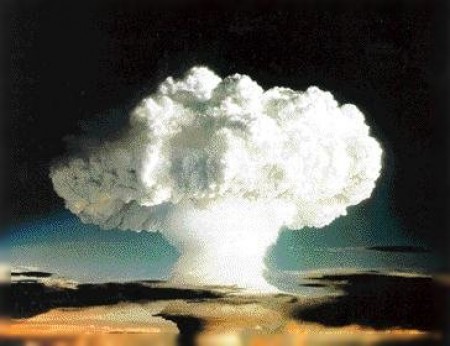 On April 24th 1945, President Harry Truman learnt the full details of the Manhattan Project, in which scientists were attempting to create the first atomic bomb. The information thrust upon Truman a momentous decision: whether or not to use the world’s first weapon of mass destruction.
On April 24th 1945, President Harry Truman learnt the full details of the Manhattan Project, in which scientists were attempting to create the first atomic bomb. The information thrust upon Truman a momentous decision: whether or not to use the world’s first weapon of mass destruction.
The Manhattan Project began modestly in 1939, but grew to employ more than 130,000 people and cost nearly US$2 billion (roughly equivalent to $25.8 billion as of 2012). Over 90% of the cost was for building factories and producing the fissionable materials, with less than 10% for development and production of the weapons. Research and production took place at more than 30 sites, some secret, across the United States, the United Kingdom and Canada.
When America’s secret development of the atomic bomb began in 1939, the then-President Franklin Roosevelt’s gave it his full support. The project was so secret that FDR did not even inform his fourth-term vice president, Truman, that it existed. In fact, when Truman’s 1943 senatorial investigations into war-production expenditures led him to ask questions about a suspicious plant in Minneapolis, which was secretly connected with the Manhattan Project, Truman received a stern phone call from FDR’s secretary of war, Harry Stimson, warning him not to inquire further.
When President Roosevelt died on April 14th 1945, Truman was immediately sworn in and, soon after, was informed by Stimson of a new and terrible weapon being developed by physicists in New Mexico. In his diary that night, Truman noted that he had been informed that the U.S. was perfecting an explosive great enough to destroy the whole world.
On April 24th Stimson and the army general in charge of the project, Leslie Groves, brought Truman a file full of reports and details on the Manhattan Project. They told Truman that although the U.S. was the only country with the resources to develop the bomb–eliminating fears that Germany was close to developing the weapon–the Russians could possibly have atomic weapons within four years. They discussed if, and with which allies, they should share the information and how the new weapon would affect U.S. foreign-policy decisions. Truman authorised the continuation of the project and agreed to form an interim committee that would advise the president on using the weapon.
Although the war in Europe ended in May 1945, Stimson advised Truman that the bomb might be useful in intimidating Soviet leader Joseph Stalin into curtailing post-war communist expansion into Eastern Europe. Truman agreed and said that if the weapon proved feasible I’ll certainly have a hammer on those [Russians]. Meanwhile the war with Japan dragged on and it looked to many as if the Japanese would never surrender. On July 16th the team of scientists at the Alamogordo, New Mexico, research station successfully exploded the first atomic bomb. Truman gave Stimson the handwritten order to release when ready but not sooner than August 2nd on July 31st 1945.
The first bomb was exploded over Hiroshima on August 6th 1945, and a second was dropped on Nagasaki on August 8th. The Japanese quickly surrendered. Although other nations have developed atomic weapons and nuclear technology since 1945, Truman remains the only world leader to have ever used an atomic bomb against an enemy.
A 1945 Life article estimated that “probably no more than a few dozen men in the entire country knew the full meaning of the Manhattan Project, and perhaps only a thousand others even were aware that work on atoms was involved.” The magazine wrote that the more than 100,000 others employed with the project “worked like moles in the dark”. Warned that disclosing the project’s secrets was punishable by 10 years in prison or a $10,000 ($129,000 today) fine, they saw enormous quantities of raw materials enter factories with nothing coming out, and monitored “dials and switches while behind thick concrete walls mysterious reactions took place” without knowing the purpose of their jobs. The result of the Manhattan Project, and the atomic bomb, amazed them as much as the rest of the world.
Discover more from Craig Hill Media
Subscribe to get the latest posts to your email.


Great read!
I still find it unbelievable that there are things like this kept from the leader of our nation. I don’t disagree, but it is just unreal. I wonder how many things are going on right now that our President or other important leaders don’t know about?
What do you mean? Truman was informed asap after being sworn in as president.
Very interesting reading … I think it was wrong to drop the 2 bombs – was it necessary to win the war against Japan????! Sometimes we are too good for our own good.
I can’t imagine being treated as such an outsider, then having this dropped into your lap.
Reblogged this on China Daily Mail.